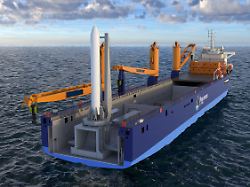First test phase planned for 2024
Germany wants to launch rockets from the North Sea
October 18, 2023, 5:20 p.m
Listen to article
This audio version was artificially generated. More info | Send feedback
According to a study, the market for space-based applications will grow to more than one trillion euros by 2040. German industry wants to be there and at the same time reduce dependencies. Starting next year, the first rockets will initially take off on a test basis from a platform in the North Sea.
The first rocket launch is planned for April 2024 in the German North Sea. Then, for the first time in a demo mission, a rocket from the Dutch company T-Minus will take off from a mobile launch platform of the “German-Offshore Spaceport Alliance” in the North Sea, said Siegfried Russwurm, President of the Federation of German Industries (BDI), at the Space Congress Lobby association in Berlin. In the future, European microlaunchers – these are mini rockets – should launch from the platform and transport satellites into space. The BDI launched the initiative for this project at its first space congress four years ago.
The rocket is to be “launched” into space from a special ship with a launch pad – that is the German spaceport. According to BDI information, the ship’s home port will be Bremerhaven. The launch point for the rocket is in the so-called Duckbill of the Exclusive German Economic Zone, about 350 kilometers off the coast. The most remote corner of this zone, in which Germany still has certain sovereign rights, is called Duckbill. The Bremen-based space company OHB is part of the “Spaceport Alliance” operator consortium.
At the same time, Russwurm called on the federal government to have greater ambitions in space policy. The background is “New Space”, an increasing commercialization of space travel. There is great potential. “In more and more industries, the following applies: Anyone who is not at the forefront in space will not be a technology leader on Earth,” said the BDI boss.
Study: Germany in “dangerous dependence”
The BDI launched the initiative for the project at its first space congress four years ago. In a statement at the time it was said that the increasing commercialization of space travel, known as “New Space”, was also a great opportunity for the industrial country of Germany. The BDI suggested that small satellites should be launched from Germany in the future, from a private space port – this gave rise to the concept of a German spaceport.
In one study The strategy consultancy Roland Berger and the BDI say that Germany is in a “dangerous dependency” when it comes to space infrastructure and access to space – which is why its own space port is now to be created. The federal government wants to support the development and construction of infrastructure with two million euros by 2025, as FDP budget politician Frank Schäffler announced at the end of September.
According to the BDI, the demo mission that has now been announced will last around two weeks. During this time, up to four rockets with a maximum length of seven meters and a flight altitude of up to 50 kilometers are planned to be launched. In the future, launchers with payloads of up to one ton should be launched into near-Earth orbits from the floating, mobile platform in the North Sea.
According to the new study, the market for space-based applications will grow by 7.4 percent annually to 1.25 trillion euros by 2040. The data would be essential for numerous economic sectors, for example for autonomous driving or for the digitalization of industrial production. Space applications, for example, enable more precise data and analyzes that increase efficiency in production and logistics.
